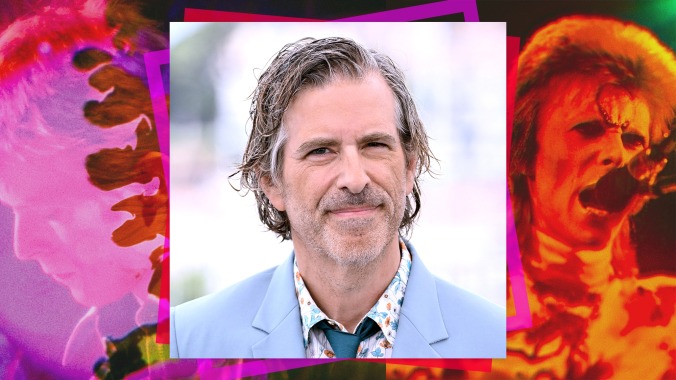Moonage Daydream's Brett Morgen on capturing the chaos and learning the lessons of David Bowie
How the director crafted an immersive film experience and found inspiration in Disneyland's Peter Pan ride

After seven years spent digging into archives, searching through mounds of recordings, and viewing untold hours of footage, Brett Morgen managed to pull together the dazzling Moonage Daydream—the first and only film about David Bowie to be approved by the late artist’s estate. Despite its classification as a documentary, the film is hardly an educational or historical vehicle. Rather, it’s a sprawling technicolor experience that allows the viewer to fill in some of the blanks in their understanding of Bowie.
And as much as Moonage Daydream chronicles the life and musical journeys of the iconic musician, it also examines Bowie’s complicated and ever-changing philosophies as an artist and as a human. Morgen talked with The A.V. Club about the process of crafting this cinematic odyssey, its enigmatic subject, and finding inspiration in Disneyland’s Peter Pan ride.
A.V. Club: When it came to editing this film, how did you toe the line between crafting an experience that is immersive versus not wanting to overwhelm the viewer?
Brett Morgen: Well, you see, that never even crossed my mind. I like to feel sound rather than hear sound. I was thinking as I was watching the film on IMAX, “You all are in my living room right now.” My television set is supersaturated. When my own movies play on television, it’s the only time I have to go and turn the chroma down. Because my chroma is already set high. I like to see the world through rose-tinted glasses and I like to feel sound. That’s where this whole thing started, from wanting to create an immersive musical experience in IMAX before I knew I was doing David Bowie. My influences and inspirations were The 400 Blows, the Peter Pan ride at Disneyland, and Pink Floyd. Those are all very immersive experiences.
Sometimes people say a work is indulgent as a criticism. Art is indulgent. I don’t want an artist to hold back. Sometimes you need to—I think of the movie Jane. I was probably more restrained than I ever had been in honoring the subject. But with Bowie, his through line is chaos and fragmentation. That’s the story. The movie was designed sort of as a transmission from the 20th century being beamed across the galaxy to a drive-in on a different planet where sentient beings were watching one of their own. And in my mind, those people also spoke in the language of chaos and fragmentation. When I tried to pitch that it didn’t go over well. It’s hard to get money for that pitch, but that was how the film was pitched.
AVC: When you were going through all of this footage, what was the moment when you were like, “Oh, his life is defined by this level of chaos.”
BM: From the very beginning. He talked about it from the start within the recorded interviews that I came across. It was a theme and a subject. Bowie would only really talk to the press when he was out promoting an album. My favorite interviews with Bowie were during the Berlin period, when he was out promoting Low and Heroes, where he really had a window and an opportunity to talk about chaos theory. I’m listening to this interview with Bowie, and he’s talking to a bunch of journalists in a hotel in Holland. He’s saying, 300 years ago all we had to do was think about where we were getting our food from. Most people lived in an agrarian society. Right now, we’re being inundated with noise and information and ideas. When you walk down the street you’re hearing a car go by, and you’re hearing a car crash, and there’s a plane going above, and someone’s talking as they go past you. How have our brains evolved in 300 years to process all this media and information? David was creating a soundtrack for that world.
David has this line where he says, “You gotta surf the chaos.” Because when you when you throw yourself into it, it’s no longer chaotic. You know, it’s like bamboo. You sort of move with it or you’ll crack. So, David just glided through life. Watching the footage, watching the interviews, was so much more illuminating and life changing than anything I got out of my undergraduate degree. I went to school with the best: David Bowie. For two years, every day, six days a week. I was absorbing these interviews, and without going too deep on this, I had a heart attack right before I started. So I was at a point in my life where I was very receptive for some guidance.
 Keep scrolling for more great stories.
Keep scrolling for more great stories.
